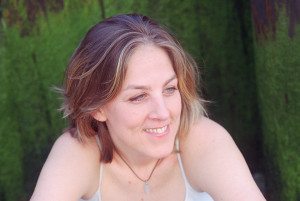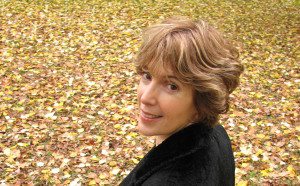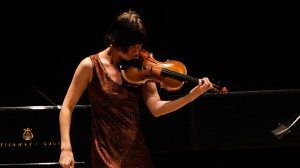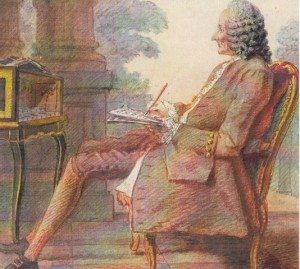As part of the worldwide commemoration of the 400th anniversary of Shakespeare’s death, University Opera will present Verdi’s final masterpiece, Falstaff. Based on material from The Merry Wives of Windsor, Henry IV, and Henry V, Falstaff is a wild, comic romp. In the UW-Madison production, updated to Hollywood in 1930, Falstaff is a has-been silent movie actor, out of work with the advent of the “talkies,” holding onto his former glory and living beyond his means at the Chateau Marmont. Now a petty criminal, Falstaff puts the make on Alice Ford and Meg Page in an effort to bilk their husbands of money. The ladies, incensed at his audacity, hatch a plot to give Falstaff his comeuppance. But not before Mr. Ford, (a movie studio executive in the UW production) acting on his own ill-founded suspicions, gets involved and complicates matters. At the end, all are reconciled as both men are taught their respective lessons.
Falstaff will be presented in Italian with English supertitles for three performances, November 11 at 7:30 pm, November 13 at 3:00 pm, and November 15 at 7:30 pm in Music Hall on the UW-Madison campus. Directed by David Ronis with James Smith conducting the UW Symphony Orchestra, the production will involve over 90 UW singers, instrumentalists, and stage crew. This production opens just one week after the national traveling exhibit of Shakespeare’s First Folio arrives at the Chazen Museum of Art.
Following the success of the panel discussion before University Opera’s production of Transformations last spring, Ronis will again be assembling a panel of colleagues to discuss Falstaff on Friday, November 11 at 6:00pm in the Music Hall, admission free. Featured panelists include:
Joshua Calhoun, Assistant Professor of English, UW-Madison
Cabell Gathman, Lecturer, Dept. of Gender and Women’s Studies, UW-Madison
Steffen Silvis, Dramaturg and Doctoral Candidate in Interdisciplinary Theatre Studies, UW-Madison
David Ronis, Karen K. Bishop Director of University Opera, UW-Madison
Susan Cook, Pamela O. Hamel/Music Board of Advisors Director of the Mead Witter School of Music, Moderator
Paul Rowe, Professor of Voice at UW-Madison, will sing the title role amidst a cast featuring current students and a couple of guest alums. The principal ladies’ roles will be filled by Yanzelmalee Rivera and Sarah Kendall (Alice Ford), Courtney Kayser and Talia Engstrom (Meg Page), Emily Weaver and Claire Powling (Nannetta), Rebecca Buechel and Jessica Kasinski (Quickly). The men in the cast will be alum Brian Schnieder and guest artist Richard Schonberg (Ford), José Muñiz (Fenton), Wesley Dunnagan (Dr. Caius), Jiabao Zhang (Bardolfo) and alum Benjamin Schultz (Pistola). Assisting Maestro Smith will be Kyle Knox, assistant conductor, with musical preparation by new professor of opera and vocal coaching, Dr. Daniel Fung, Chan Mi Jean, and chorus master, Christopher Boveroux.
The physical production will be designed by Greg Silver. Costume design is by Sydney Krieger, and Hyewon Park, lighting design by Kenneth Ferencek, props design by David Heuer, and the production stage manager will be Alec Brown. The production staff include Erin Bryan, operations manager for University Opera; Jimmy Dewhurst and Daniel Lewis, master electricians; and Ethan White, lighting board operator.
Tickets are $25.00 for the general public, $20.00 for senior citizens and $10.00 for UW-Madison students, available in advance through the Campus Arts Ticketing office at (608) 265-ARTS and online at http://www.arts.wisc.edu/ (click “box office”). Tickets may also be purchased in person at the Wisconsin Union Theater Box Office Monday-Friday, 11:30 a.m.-5:30 p.m. and Saturdays, 12:00-5:00 p.m. and the Vilas Hall Box Office, Monday-Friday, 11:30 a.m.-5:30 p.m., and after 5:30 p.m. on University Theatre performance evenings. Because shows often sell out, advance purchase is recommended. If unsold tickets remain, they may be purchased at the door beginning one hour before the performance. The Carol Rennebohm Auditorium is located in Music Hall, at the foot of Bascom Hill on Park Street.
University Opera is a cultural service of the School of Music at the University of Wisconsin-Madison whose mission is to provide comprehensive operatic training and performance opportunities for our students and operatic programming to the community. For more information, please contact opera@music.wisc.edu. Or visit the School of Music’s web site at music.wisc.edu.
BRASS, BRASS AND MORE BRASS – With No. 3, UW-Madison cements a tradition as a Brass Hub of the Midwest
On September 30 and October 1, 2016, the newly renamed Mead Witter School of Music will welcome the internationally acclaimed Stockholm Chamber Brass to campus for a third annual Brass Fest. The quintet’s tour of upstate New York, Michigan and Wisconsin will be their first-ever appearances in the United States.
Brass Fest III will also mark the first time that high school students will play an active role, attending master classes and performing on stage in a final Festival Brass Concert. Area high schools planning to attend include Middleton, Madison East, Madison West, Edgewood, and Memorial.
A number of major instrument makers and music companies, many located in Wisconsin, will also be on hand to display their wares. The School will also offer commemorative fund-raising t-shirts; scroll to bottom to learn more.
The events will include a concert with Stockholm Chamber Brass on Friday, September, 30, at 8 PM, and a second concert on October 1, also at 8 PM, with the Stockholm Chamber Brass, the Wisconsin Brass Quintet, UW-Madison student performers and selected high school students. Both concerts will be held in Mills Hall in the Humanities Building.
Tickets: $20 for Friday’s concert ($5.00 non-music students); $15 for Saturday’s concert ($5.00 non-music students). Buy tickets here or at the door.
“We are expanding the festival because our mission is to perform and to teach,” says Daniel Grabois, assistant professor of horn and member of the Wisconsin Brass Quintet. “We are motivated by the Wisconsin Idea, and we are making every effort to bring what we do to the population of the state. There are many students in the state who play brass instruments, and we want to include them in our educational mission. We also want to build on the successes of the past two years – many people enthusiastically attended the festival, and we want to make it better, more exciting, and more inclusive.”
Stockholm Chamber Brass, formed in 1985, consists of some of Scandinavia’s leading brass musicians. Its five members are all prize winners at major international solo competitions, including the ARD-Wettbewerb, CIEM Geneve, Markneukrichen and Toulon. Their international breakthrough came in 1988 when Stockholm Chamber Brass won 1st Prize at “Ville de Narbonne,” the most prestigious international competition for brass quintets.
Stockholm Chamber Brass has performed at Bad Kissingen Sommer, the Schleswig-Holstein Music Festival, Niedesächsische Musiktage, International de Musique Sion Valais, the Prague Spring Music Festival, the Budapest International Music Festival, Festival Internacional de Santander, the Soundstream Festival in Toronto, the Belfast Festival at Queen’s, the Umeå International Chamber Music Festival and the Stockholm New Music Festival. The ensemble has also performed at various brass festivals, including the Lieksa Brass Week, the International Trombone Festival in Helsinki, the Melbourne International Festival of Brass, Epsival Limoge and the Blekinge International Brass Academy.
Stockholm Chamber Brass has received glowing reviews for its CDs. A reviewer at American Record Guide writes, “I cannot imagine that a better brass quintet has ever existed.”
The ensemble’s repertoire consists mostly of original compositions and their own arrangements of older and contemporary music. Their interest in new music has resulted in over thirty compositions written specifically for the ensemble. Stockholm Chamber Brass has worked with a long list of leading composers, including Anders Hillborg, Sven-David Sandström, Pär Mårtensson, Britta Byström, Henrik Strindberg Piers Hellawell and Eino Tamberg. The ensemble has also collaborated with leading brass soloists Håkan Hardenberger and Christian Lindberg.
The current members of the Stockholm Chamber Brass are Urban Agnas, trumpet; Tom Poulson, trumpet; Jonas Bylund, trombone; Annamia Larsson, horn; and Sami Al Fakir, tuba.
The Wisconsin Brass Quintet, formed in 1972, is one of three faculty chamber ensembles in-residence at the University of Wisconsin-Madison Mead Witter School of Music. Deeply committed to the spirit of the Wisconsin Idea, the group travels widely to offer its concerts and educational services to students and the public in all corners of the state.
The Wisconsin Brass Quintet includes John Aley, trumpet; Matthew Onstad, trumpet; Mark Hetzler, trombone; Tom Curry, tuba; and Daniel Grabois, horn.
New this year: Commemorative Limited Edition T-Shirts, featuring our new Brass Fest III logo on the front and “Mead Witter School of Music” on the back. Prices from $11 to $14; all proceeds will support the School of Music. Send an email to t-shirt sales if you’d like to buy one.
When Teri Dobbs was twelve years old, growing up in the tiny farming town of Platte, South Dakota, her mother took her aside and broached a topic that would forever change the young girl’s life.
“My mom started educating me about the Holocaust, and gave me a book,” says Dobbs, an associate professor of music and chair of the music education program at UW-Madison. “She said, ‘You need to read this book, because it could have been us.’ ’’ It was about the extermination camp at Treblinka, during World War II in Poland.
Dobbs asked her what she meant.
“Performing the Jewish Archives” is a $2.5 million grant to five universities to mount recently rediscovered Jewish musical, theatrical and literary works created from 1880 to 1950, and encourage the creation of new works based on archives.
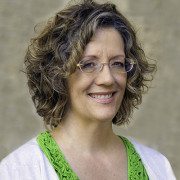
Teri Dobbs. Photograph by Michael R. Anderson.
Her mom replied, “Well, your grandfather’s Jewish.” Dobbs was bewildered, and her mother explained: He was one of the only Jewish people in town, his mother having been part of a wave of Jewish immigrants in the late 19th century who became merchants, peddlers and farmers on the Great Plains. His name was Gerrit Dyke.
Dobbs kept reading. She asked questions. She wanted to know: How did a Dutch Jewish woman, Maria Louisa Rosenthal, land in the middle of South Dakota in the 1880s? After marrying Govert VanderBoom, a non-Jewish Dutch man, Maria Louisa took his name, but the name Rosenthal was not forgotten. Dobbs’ mom kept a trove of family papers, including Maria Louisa’s obituary, who in her papers consistently referred to herself as “Maria Louisa Rosenthal VanderBoom.” And, when asked, extended family members replied, “Yes, Maria was Jewish.” But that was the end of the conversation.
It wasn’t the end of Dobbs’ interest in Jewish history, however.
In 2002, she became a Jew by choice and married a Jewish man. As it happened, her husband, Jesse Markow, had a similar background: his grandfather, Morris (Moishe) Markov had emigrated from the Ukraine, from a shtetl called Markova, located in what was known then as the Pale of Jewish Settlement. Markow arrived in New York City around 1904 as a single man, with only a wooden flute in his pocket that he’d formerly played in the Russian czar’s army, and found his first job working at a laundry at the dockyards.

Dobbs’ husband, Jesse Markow, with his grandfather’s flute.
Neither Rosenthal nor Markov maintained any links to their former homelands. And so it was for so many expatriate Jews at that time.
Meanwhile, Dobbs grew up. She went to college at the University of South Dakota and served four years with the United States Air Force Academy Band as a flutist and singer, then taught band, orchestra, vocal music, and general music in Colorado, South Dakota, and Illinois. Later, in graduate school at Northwestern University, where she earned a master’s degree in 1992 and a Ph.D in music education in 2005, she found herself drawn to that Jewish history, and started delving into music created and performed during the Holocaust, or Shoah.
At UW-Madison, where she arrived in 2006 as an assistant (now associate) professor of music education, she focused on children’s musical experiences in the ghetto at Theresienstadt, known now as Terezín. During World War II, Terezín, an 18th-century fortified city in Czechoslovakia, not far from Prague, was converted by the Nazis into a transit camp for thousands of largely upper class, educated Jews, including well-known artists, writers, and composers, most of whom who ultimately were killed in concentration camps. One of those, the composer Hans Krasa, had written a children’s operetta, Brundibár, which was performed over 50 times by children at Terezín.
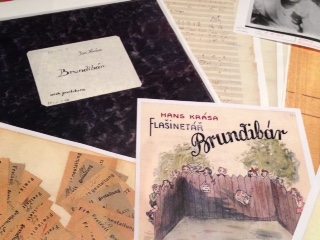
Artifacts from the children’s operetta, Brundibár.
Performing Brundibár provided a way for the Jews at Terezín to preserve some semblance of culture as society was disintegrating all around them. It also provided Dobbs the entrée into a field of study that had so long intrigued her.
In 2010, she began an intense study of the operetta, culminating in a paper published last fall in the Philosophy of Music Education Review, “Remembering the Singing of Silenced Voices: Brundibár and Problems of Pedagogy,” in which Dobbs explored the cognitive dissonance of music-making during wartime and questioned how the opera is taught today. On a recent sabbatical, she spent time researching the archives in the Jewish Museum of Prague and the Terezín Memorial, in addition to Yale University’s Fortunoff Video Archive for Holocaust Testimonies and the Shoah Foundation Video History Archive at the University of Southern California.
In Prague, she interviewed survivors of Terezín, some of whom had sung in the Brundibár chorus. All shed light on how valuable the experience of music making was to people trapped inside the ghetto, and provide insight into music education today.
“Studying Brundibár is, in a way, studying the ‘present absence’ of people who are no longer with us,” Dobbs says. “When we hear the operetta, we hear the voices of children who were silenced.”
It turned out that Dobbs’ work fit perfectly within a framework being developed by researchers elsewhere.
Due to her pedagogical pedigree, Dobbs was recently named an international co-investigator in a $2.5 million grant to mount recently rediscovered Jewish musical, theatrical and literary works created from 1880 to 1950, and to encourage the creation of new works based on archives. The grant, called “Performing the Jewish Archive,” was awarded by the British Arts & Humanities Research Council, and is led by Dr. Stephen Muir at the University of Leeds in England. Other co-investigators include Dr. Helen Finch, School of Languages, Cultures and Societies, University of Leeds; Dr. Lisa Peschel, Film, Theatre and Television, University of York; Dr. Nick Barraclough, Psychology, University of York; Dr. Joseph Toltz, Sydney Conservatorium, University of Sydney; and Dr. David Fligg, Leeds College of Music.
The three-year “Performing the Jewish Archive” project will involve a large number of partners, exploring archives, delivering community and educational projects, holding at least two international conferences and a series of symposia at the British Library, as well as mounting five international performance festivals – in the United States, the Czech Republic, South Africa, Australia and Yorkshire, England. Madison — where two of those festivals will take place in 2015 and 2016 — is the only United States site to be chosen. The goal of the performance festivals is to uncover lost and damaged theater scripts, musical scores and works of literature so that they may be experienced by modern audiences.
Not so long ago, lead investigator Stephen Muir himself, on a trip to South Africa, unearthed a musical score called “One Little Goat” by a previously unknown Russian Jewish composer, David Eisenstadt (Dovid Ajzensztadt). Eisenstadt had lost his life at the Treblinka concentration camp but had given the manuscript to a friend to review. Decades ago, the score had wended its way to South Africa via a friend and was finally premiered last spring in England.
Brundibár is only one example of the wealth of Jewish performance art that has been lost for so long. And so the race is on to find others, to preserve them, and to present them. And for at least one researcher, it will also help open a door to her own past.
“Having the opportunity to do this kind of research/scholarship in many ways brings me full circle, connecting and reconnecting me with a part of my heritage that was hidden for so long,” says Dobbs. “It’s a way for me to return to my roots by remembering actively those who went before me, maybe even to make things a bit better for those who come after me. In Judaism, this can be considered a type of ‘tikkun olam,’ or ‘healing the world.'”
Read about Dobbs’ research in a story published in the online newsletter of the Center for Jewish Studies.
“Remembering the Singing of Silenced Voices”: Philosophy of Music Education Review, Fall 2013, Teryl Dobbs, author.
More media links:
Brass, jazz and three composers–American George Crumb, Cecilia McDowall of the United Kingdom, and France’s Jean-Philippe Rameau — will be showcased this year at the UW-Madison School of Music in the form of five multi-event guest artist festivals, starting in October and continuing through April. Funding is provided by the Vilas Trust and Anonymous Fund at UW-Madison. We thank them for their support.
Other notable events will include an eight-concert faculty/student “Showcase Series” series, presenting some of the most dynamic music that the School has to offer. Click here for Showcase info.
Some events are ticketed (click here for info). Tickets will go on sale one month ahead of time. All other events at the School of Music, including dozens of faculty recitals, student ensembles and individual guest artists, continue to be free.
Our 2014-15 festivals include:
“Celebrate Brass”
Wednesday, October 8 — Monday, October 13, 2014
Brass music is often known for its swagger, but it is also famous for delicate polyphonies and burnished tones. We invite the public to experience the beauty of brass first-hand at a festival featuring both a full array of music and musicians, many at the height of their careers.
Performers will include famed Norwegian tubist Øystein Baadsvik, the only musician to have created a career as a tuba soloist, rather than becoming a member of an orchestra or accepting a teaching post. His multi-faceted musical career as a soloist, chamber musician and recording artist has taken him all over the world. Øystein Baadsvik’s international career began in 1991 when he was awarded two prizes at the prestigious Concours International d’Exécution Musicale in Geneva.
Baadsvik will be joined by hornist Jessica Valeri (BM, UW-Madison, 1997) of the San Francisco Symphony Orchestra, Michigan’s Western Brass Quintet, UW-Madison’s Wisconsin Brass Quintet, renowned brass composer and blogger Anthony Plog, new UW-Madison faculty tubist Tom Curry, as well the best brass players and conductors at the University, including a Brass Choir led by conductor Scott Teeple.
Events will include concerts, solo recitals, masterclasses, brass coachings, a colloquium and a reception.
Click here for full schedule.
The 4th Annual UW-Madison/Madison Metropolitan School Jazz Festival
Wednesday, December 3 — Saturday, December 6, 2014
A festival featuring workshops and performances for college and high school jazz performers. This marks the first time that UW-Madison will host the event.
This festival will feature Ingrid Jensen, trumpeter, bandleader, artist-in-residence at the University of Michigan and part-time faculty member at the Peabody Conservatory. Ingrid Jensen has been a major figure on the international jazz scene for over 20 years. Her three CDs for the ENJA label and her latest CD, “At Sea,” won her nominations from the Canadian Juno Awards, including an award in 1995 for Vernal Fields. In addition to her work as a leader of the quartet Project O and the quintet Nordic Connect, Jensen is a featured soloist with the Maria Schneider Orchestra, with whom she recorded four albums, including the Grammy Award-winning “Concert in the Garden” and “Sky Blue,” the former of which was also named Jazz Album of the Year by the Jazz Journalists Association.
Jensen is a member of the Mosaic project with Terri-Lynn Carrington, Esperanza Spaulding and Geri Allen; the Darcy James Argue’s Grammy-nominated Secret Society; the Juno-award winning Christine Jensen Orchestra; has been featured on Gil Evans’ Porgy and Bess at the San Francisco Jazz Festival, under the direction of Maria Schneider; and has appeared as a guest in the festival’s “Tribute to Woody Shaw and Freddie Hubbard”, alongside Terence Blanchard, Eddie Henderson, Bobby Hutcherson and Kenny Garrett.
The festival will include master classes in jazz trumpet and improvisation, open rehearsals, a Saturday high school clinic, and performances with UW jazz ensembles and high school big bands from Madison and Middleton.
This festival is free and open to the public.
Click here for full schedule.
“Seventy Degrees Below Zero”: A concert series and residency showcasing the music of British composer Cecilia McDowall
Friday, February 19 through Sunday, February 23, 2015
In 2009, after premiering a McDowall work, “Framed,” UW-Madison trumpet professor John Aley discovered for himself what he describes as the “challenging, energizing, poetic, clever, tongue in cheek, and utterly beautiful” music of Cecilia McDowall.
Our festival, organized by Aley, will feature the first-ever United States residency of British composer Cecilia McDowall and the US premiere of her symphonic work “Seventy Degrees Below Zero,” commissioned by the City of London Sinfonia and the Scott Polar Research Institute, based in Cambridge, England.
Often inspired by extra-musical influences, McDowall’s writing combines a rhythmic vitality with expressive lyricism. She has won many awards and has been short-listed several times for the British Composer Awards. Her music has been commissioned and performed by leading choirs, including the BBC Singers, ensembles and at major festivals both in Britain and abroad and has been broadcast on BBC Radio and worldwide.
“Seventy Degrees Below Zero” is a cantata for solo voice (to be sung by faculty tenor Jim Doing) and orchestra, inspired by a phrase written by British captain Robert Falcon Scott to his wife, prior to his death while returning from an expedition to the South Pole: ‘Dear, it is not easy to write because of the cold – 70 degrees below zero.’ ”
Joining us on Saturday will be Michael DuVernois of the UW-Madison IceCube Particle Astrophysics Center, only recently returned from the Antarctic, who will present an entertaining and educational talk, complete with historic and modern photographs, on the progression of Antarctic exploration from the heroic age through modern science on the coldest, highest, driest continent.
Other works to be performed during the three-day festival include the first US performances of “Regina Caeli,” for four trumpets and four trombones, and “Cavatina at Midnight,” for clarinet, cello and piano. Her haunting choral works “Ave Regina” and “Ave Maris Stella” will be performed by the UW Chamber Choir, directed by Bruce Gladstone. In addition to Jim Doing, faculty performers will include pianists Christopher Taylor and Martha Fischer, clarinetist Linda Bartley, soprano Elizabeth Hagedorn, oboist Kostas Tiliakos, trombonist Mark Hetzler, trumpeter John Aley, cellist Parry Karp, percussionist Anthony Di Sanza, violist Sally Chisholm, and others.
In 2008, the Phoenix Chorale won a Grammy Award for “Best Small Ensemble Performance” for its Chandos CD, “Spotless Rose: Hymns to the Virgin Mary,” which included a work, “Three Latin Motets” by Cecilia McDowall.
Click here for full schedule.
Read a review in The Guardian newspaper of the UK premiere of “Seventy Degrees Below Zero.”
“Honoring George Crumb at 85”
Sunday, March 22 and Monday, March 23, 2015
George Crumb has been a major force in American composition since the 1960s when his Ancient Voices of Children set to texts by Garcia Lorca provided an evocative and deeply personal response to late modernist serialism. The winner of both a Pulitzer Prize and Grammy, Crumb continues to compose new works, most recently his American Songbooks, that celebrate the magic and mystery of life. Crumb’s music often juxtaposes contrasting musical styles and quotes from pre-existing works, and his use of extended instrumental techniques shows his predilection for new sound colors. Many of Crumb’s works include programmatic, symbolic, mystical and theatrical elements, which are often reflected in his beautiful and meticulously notated scores.
Crumb’s 85th birthday provides an opportunity to celebrate this composer through concerts, workshops, and master classes featuring guest artists as well as our own faculty and students. The program will include a performance of the “Crumb Madrigals” by Chicago duo Due East and a concert by New York-based violinist Miranda Cuckson, as well as a performance of “The Violinists in My Life,” written by faculty composer Laura Schwendinger.
Cuckson is highly acclaimed for her performances of a wide range of repertoire, from early eras to the most current creations. In demand as a soloist and chamber musician, she appears in major concert halls, as well as at universities, galleries and informal spaces. She has performed at such venues as the Berlin Philharmonie, Carnegie Hall, the Library of Congress, Miller Theatre, the 92nd Street Y, Guggenheim Museum, and many more.
Nunc (Latin for “now”) was founded in 2007 as “Transit Circle ” by artistic director and violinist/violist Miranda Cuckson, and was renamed and incorporated as a not-for-profit organization in 2012. Nunc is devoted to presenting high-caliber performances of music of current, recent and older eras, through distinctive programming that highlights their innovations and contributions.
Due East (Erin Lesser, flutes; Greg Beyer, percussion) actively promotes new music and seeks to expand the flute and percussion duo genre through frequent commissions and premieres. Their first recording, Simultaneous Worlds, is available on Albany Records. Their second recording, Drawn Only Once, is a multi-media CD/DVD now available on New Amsterdam Records. Noted critic Steve Smith gave it a rare 5.0-star rating in Time Out New York, calling it “spellbindingly beautiful.”
Click here for full schedule.
Read a review of Miranda Cuckson in the New York Times.
“Rediscovering Rameau”
Multiple events; check back later for more details.
A year-long festival marking the 250th anniversary of the death of French Baroque composer Jean-Philippe Rameau.
The UW-Madison and community partners will offer a series of public events beginning this fall and culminating in April with two concert performances of Rameau’s one-act opera, Pygmalion, by the Madison Bach Musicians.
Learn more about Rameau here.
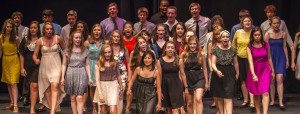
06/24/2014
For 80 years, UW-Madison’s Summer Music Clinic has provided its campers with the chance to learn new skills through a variety of different classes and performance opportunities.
According to program manager Anne Aley, Summer Music Clinic offers two instructional sessions—one for middle school students, which was held the week of June 16, and one for high school students, which concludes Friday, June 27.
Read the full story here:
http://www.news.wisc.edu/22944






